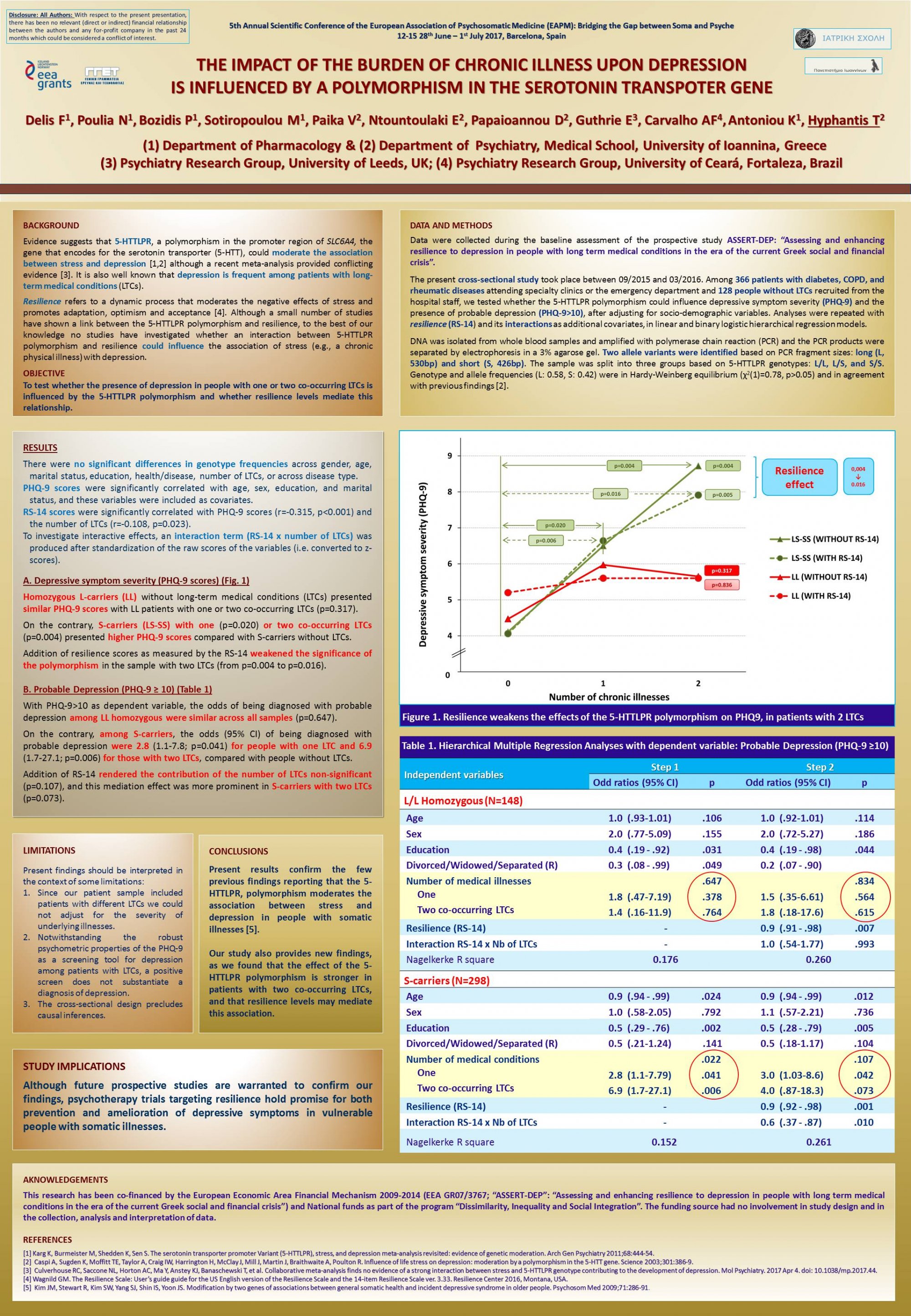Congress communication #6
The impact of the burden of chronic illness upon depression is influenced by a polymorphism in the serotonin transporter gene
Foteini Delis, Nafsika Poulia, Petros Bozidis, Marianthi Sotiropoulou, Vassiliki Paika, Elisavet Ntountoulaki, Dimitra Papaioannou, Else Guthrie, Andre F Carvalho, Katerina Antoniou, Thomas Hyphantis
5th Annual Scientific Conference of the European Association of Psychosomatic Medicine - EAPM, Barcelona, Spain, June 28th - July 1st, 2017
The impact of the burden of chronic illness upon depression is influenced by a polymorphism in the serotonin transporter gene
Delis Foteini1, Poulia Nafsika1, Bozidis Petros1, Sotiropoulou Marianthi1, Paika Vassiliki2, Ntountoulaki Elisavet2, Papaioannou Dimitra2, Guthrie Else3, Carvalho F Andre4, Antoniou Katerina1, Hyphantis Thomas2
(1) Department of Pharmacology; (2) Department of Psychiatry, Medical School, University of Ioannina, Greece
(3) Psychiatry Research Group, Medical School, University of Manchester, UK
(4) Department of Clinical Medicine, Faculty of Medicine, University of Ceará, Fortaleza, Brazil
Aims: Evidence suggests that depressive responses to environmental adversities are moderated by the genetic makeup, and that depression is frequent among patients with long-term conditions (LTCs). We aimed to test whether the presence of depression in people with one or two comorbid LTCs is influenced by a polymorphism in SLC6A4, the gene that encodes for serotonin transporter (5-ΗΤΤ).
Methods: Between 09/2015 and 03/2016, among 366 patients with diabetes, COPD, and rheumatic diseases and 128 people without LTCs, we tested whether the 5-HTTLPR polymorphism could influence depressive symptom severity (PHQ-9) and the presence of probable depression (PHQ-9>10), after adjusting for socio-demographic variables. Analyses were repeated with resilience (RS-14) and its interactions as additional covariates, in linear and binary logistic hierarchical regression models.
Results: Homozygous L-carriers (LL) without LTCs presented similar PHQ-9 scores with LL patients with one or two comorbid LTCs (p=0.317). On the contrary, S-carriers with one (p=0.020) or two comorbid LTCs (p=0.004) presented higher PHQ-9 scores compared with S-carriers without LTCs. Addition of RS-14 weakened the importance of the polymorphism in the sample with two LTCs (p=0.016). With PHQ-9>10 as dependent variable, the odds of being diagnosed with probable depression among LL homozygous were similar across all samples (p=0.378). On the contrary, among S-carriers, the odds (95% CI) of being diagnosed with probable depression were 2.8 (1.04-7.80; p=0.041) for people with one LTC and 6.7 (1.75-27.1; p=0.006) for those with two LTCs, compared with people without LTCs. Addition of RS-14 rendered the comparison between S-carriers with two LTCs and those without LTCs non-significant (p=0.073).
Conclusions: In people with LTCs, the presence of depression is influenced by the 5-HTTLPR polymorphism, especially for patients with two comorbid LTCs. Resilience may have the potential to moderate this influence, indicating that psychotherapeutic efforts targeting resilience may aid in the alleviation of the vulnerability to depression in people with increased burden of chronic illness.
Acknowledgements: This research has been co-financed by the European Economic Area Financial Mechanism 2009-2014 (EEA GR07/3767) and National funds as part of the program “Dissimilarity, Inequality and Social Integration”.



